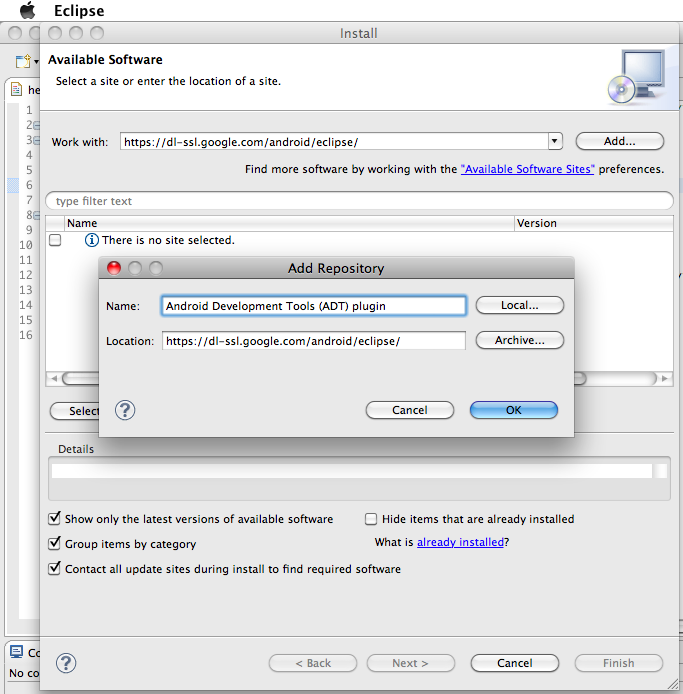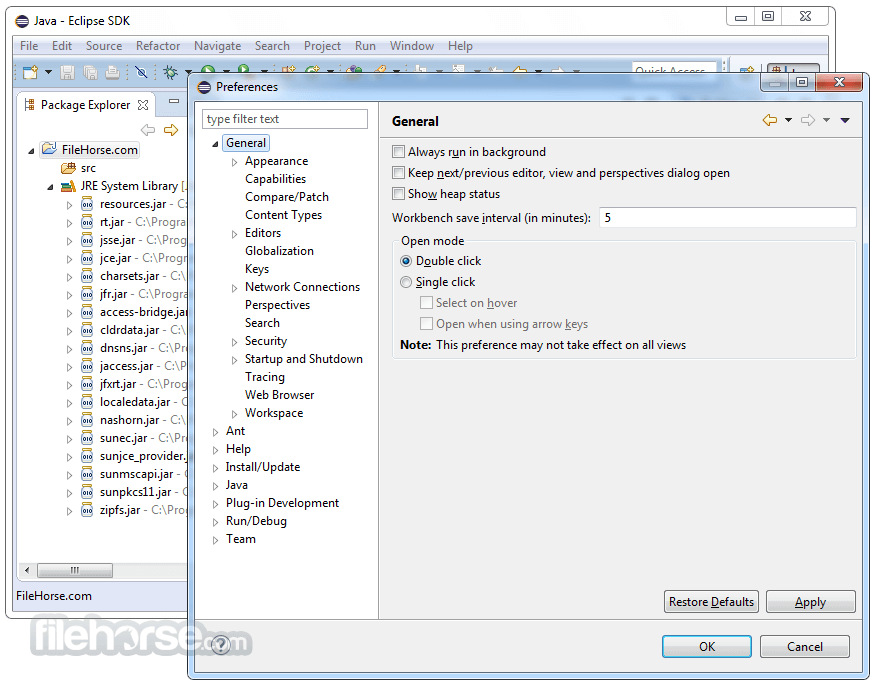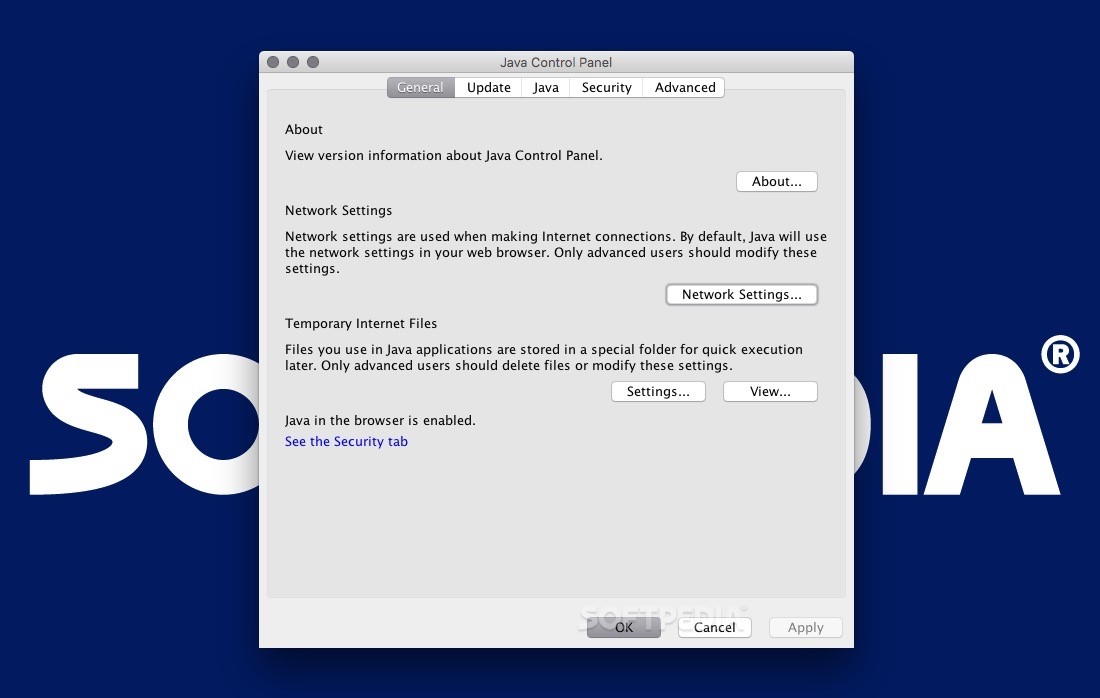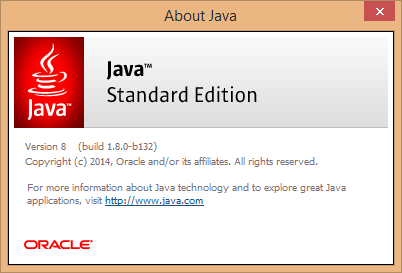Download Oracle Java for Mac to official Java runtime for Mac OS X Lion or higher. Oracle Java has had 1 update within the past 6 months. Looking for Oracle OpenJDK builds? Oracle Customers and ISVs targeting Oracle LTS releases: Oracle JDK is Oracle's supported Java SE version for customers and for developing, testing, prototyping or demonstrating your Java applications. End users and developers looking for free JDK versions: Oracle OpenJDK offers the same features and performance as Oracle JDK under the GPL license.
The full version string for this update release is 11.0.9+10 (where '+' means 'build'). The version number is 11.0.9.
Complete release notes for Java 11 can be found here.
IANA Data 2020a
JDK 11.0.9 contains IANA time zone data version 2020a. For more information, refer to Timezone Data Versions in the JRE Software.


Oracle Latest Version Of Java Mac Download Windows 10
Security Baselines
The security baselines for the Java Runtime Environment (JRE) at the time of the release of JDK 11.0.7 are specified in the following table:
JRE Family Version = JRE Security Baseline (Full Version String)
- 11 = 11.0.9+7
- 8 = 1.8.0_271-b09
Oracle JDK Expiration Date
Oracle Latest Version Of Java Mac Download Torrent
Oracle recommends that the JDK is updated with each Critical Patch Update (CPU). In order to determine if a release is the latest, the following Security Baseline page can be used to determine which is the latest version for each release family.

Critical patch updates, which contain security vulnerability fixes, are announced one year in advance on Critical Patch Updates, Security Alerts and Bulletins. It is not recommended that this JDK (version 11.0.9) be used after the next critical patch update scheduled for January 19, 2021.

What's New:
security-libs/java.security
➜ Weak Named Curves in TLS, CertPath, and Signed JAR Disabled by Default
- Weak named curves are disabled by default by adding them to the following disabledAlgorithms security properties: jdk.tls.disabledAlgorithms, jdk.certpath.disabledAlgorithms, and jdk.jar.disabledAlgorithms. The named curves are listed below.
- With 47 weak named curves to be disabled, adding individual named curves to each disabledAlgorithms property would be overwhelming. To relieve this, a new security property, jdk.disabled.namedCurves, is implemented that can list the named curves common to all of the disabledAlgorithms properties. To use the new property in the disabledAlgorithms properties, precede the full property name with the keyword include. Users can still add individual named curves to disabledAlgorithms properties separate from this new property. No other properties can be included in the disabledAlgorithms properties.
- To restore the named curves, remove the include jdk.disabled.namedCurves either from specific or from all disabledAlgorithms security properties. To restore one or more curves, remove the specific named curve(s) from the jdk.disabled.namedCurves property.
- Curves that are disabled through jdk.disabled.namedCurves include the following: secp112r1, secp112r2, secp128r1, secp128r2, secp160k1, secp160r1, secp160r2, secp192k1, secp192r1, secp224k1, secp224r1, secp256k1, sect113r1, sect113r2, sect131r1, sect131r2, sect163k1, sect163r1, sect163r2, sect193r1, sect193r2, sect233k1, sect233r1, sect239k1, sect283k1, sect283r1, sect409k1, sect409r1, sect571k1, sect571r1, X9.62 c2tnb191v1, X9.62 c2tnb191v2, X9.62 c2tnb191v3, X9.62 c2tnb239v1, X9.62 c2tnb239v2, X9.62 c2tnb239v3, X9.62 c2tnb359v1, X9.62 c2tnb431r1, X9.62 prime192v2, X9.62 prime192v3, X9.62 prime239v1, X9.62 prime239v2, X9.62 prime239v3, brainpoolP256r1, brainpoolP320r1, brainpoolP384r1, brainpoolP512r1
- Curves that remain enabled are: secp256r1, secp384r1, secp521r1, X25519, X448. See JDK-8233228
security-libs/org.ietf.jgss:krb5
➜ Support for Kerberos Cross-Realm Referrals (RFC 6806)
- The Kerberos client has been enhanced with the support of principal name canonicalization and cross-realm referrals, as defined by the RFC 6806 protocol extension.
- As a result of this new feature, the Kerberos client can take advantage of more dynamic environment configurations and does not necessarily need to know (in advance) how to reach the realm of a target principal (user or service).
- Support is enabled by default and 5 is the maximum number of referral hops allowed. To turn it off, set the sun.security.krb5.disableReferrals security or system property to false. To configure a custom maximum number of referral hops, set the sun.security.krb5.maxReferrals security or system property to any positive value.

Oracle Latest Version Of Java Mac Download Windows 10
Security Baselines
The security baselines for the Java Runtime Environment (JRE) at the time of the release of JDK 11.0.7 are specified in the following table:
JRE Family Version = JRE Security Baseline (Full Version String)
- 11 = 11.0.9+7
- 8 = 1.8.0_271-b09
Oracle JDK Expiration Date
Oracle Latest Version Of Java Mac Download Torrent
Oracle recommends that the JDK is updated with each Critical Patch Update (CPU). In order to determine if a release is the latest, the following Security Baseline page can be used to determine which is the latest version for each release family.
Critical patch updates, which contain security vulnerability fixes, are announced one year in advance on Critical Patch Updates, Security Alerts and Bulletins. It is not recommended that this JDK (version 11.0.9) be used after the next critical patch update scheduled for January 19, 2021.
What's New:
security-libs/java.security
➜ Weak Named Curves in TLS, CertPath, and Signed JAR Disabled by Default
- Weak named curves are disabled by default by adding them to the following disabledAlgorithms security properties: jdk.tls.disabledAlgorithms, jdk.certpath.disabledAlgorithms, and jdk.jar.disabledAlgorithms. The named curves are listed below.
- With 47 weak named curves to be disabled, adding individual named curves to each disabledAlgorithms property would be overwhelming. To relieve this, a new security property, jdk.disabled.namedCurves, is implemented that can list the named curves common to all of the disabledAlgorithms properties. To use the new property in the disabledAlgorithms properties, precede the full property name with the keyword include. Users can still add individual named curves to disabledAlgorithms properties separate from this new property. No other properties can be included in the disabledAlgorithms properties.
- To restore the named curves, remove the include jdk.disabled.namedCurves either from specific or from all disabledAlgorithms security properties. To restore one or more curves, remove the specific named curve(s) from the jdk.disabled.namedCurves property.
- Curves that are disabled through jdk.disabled.namedCurves include the following: secp112r1, secp112r2, secp128r1, secp128r2, secp160k1, secp160r1, secp160r2, secp192k1, secp192r1, secp224k1, secp224r1, secp256k1, sect113r1, sect113r2, sect131r1, sect131r2, sect163k1, sect163r1, sect163r2, sect193r1, sect193r2, sect233k1, sect233r1, sect239k1, sect283k1, sect283r1, sect409k1, sect409r1, sect571k1, sect571r1, X9.62 c2tnb191v1, X9.62 c2tnb191v2, X9.62 c2tnb191v3, X9.62 c2tnb239v1, X9.62 c2tnb239v2, X9.62 c2tnb239v3, X9.62 c2tnb359v1, X9.62 c2tnb431r1, X9.62 prime192v2, X9.62 prime192v3, X9.62 prime239v1, X9.62 prime239v2, X9.62 prime239v3, brainpoolP256r1, brainpoolP320r1, brainpoolP384r1, brainpoolP512r1
- Curves that remain enabled are: secp256r1, secp384r1, secp521r1, X25519, X448. See JDK-8233228
security-libs/org.ietf.jgss:krb5
➜ Support for Kerberos Cross-Realm Referrals (RFC 6806)
- The Kerberos client has been enhanced with the support of principal name canonicalization and cross-realm referrals, as defined by the RFC 6806 protocol extension.
- As a result of this new feature, the Kerberos client can take advantage of more dynamic environment configurations and does not necessarily need to know (in advance) how to reach the realm of a target principal (user or service).
- Support is enabled by default and 5 is the maximum number of referral hops allowed. To turn it off, set the sun.security.krb5.disableReferrals security or system property to false. To configure a custom maximum number of referral hops, set the sun.security.krb5.maxReferrals security or system property to any positive value.
Previous versions:
Latest Version Of Oracle Java
Recent Java JDK news
- Python also gained some 2.2 million developers in the past year and came in second-place
- 150 votesJava allows you to play online games, chat with people around the world, calculate your mortgage interest, and view images in 3D, just to name a few. This new version is considered a Critical Patch Update.
- Freeware
- Windows/macOS/Linux
- 25 votesJava SE 15.0.1 is the latest release of Java SE Platform. Oracle strongly recommends that all Java SE users upgrade to this release.
- Freeware
- Windows/macOS/Linux
- 115 votesThe Java Platform lets you develop and deploy Java applications on desktops and servers, as well as in today's demanding embedded environments.
- Freeware
- Windows
This topic includes the following sections:
System Requirements for Installing the JDK on macOS
The following are the system requirements for installing the JDK on macOS:
Any Intel-based computer running macOS.
Administrator privileges.
You cannot install Java for a single user. Installing the JDK on macOS is performed on a systemwide basis for all users. Administrator privileges are required to install the JDK on macOS.
Determining the Default JDK Version on macOS
When starting a Java application through the command line, the system uses the default JDK.
Java Download Latest Version
You can determine which version of the JDK is the default by entering java -version in a Terminal window. If the installed version is 13 Interim 0, Update 0, and Patch 0, then you see a string that includes the text 13. For example:
To run a different version of Java, either specify the full path, or use the java_home tool. For example:
$ /usr/libexec/java_home -v 13 --exec javac -version
Installing the JDK on macOS
- Download the JDK
.dmgfile,jdk-13.interim.update.patch_osx-x64_bin.dmg.Before the file can be downloaded, you must accept the license agreement.
- From either the browser Downloads window or from the file browser, double-click the
.dmgfile to start it.A Finder window appears that contains an icon of an open box and the name of the.pkgfile. - Double-click the
JDK 13.pkgicon to start the installation application.The installation application displays the Introduction window. - Click Continue.
- Click Install. A window appears that displays the message: Installer is trying to install new software. Enter your password to allow this.
- Enter the Administrator user name and password and click Install Software.The software is installed and a confirmation window is displayed.
.dmg file if you want to save disk space. Uninstalling the JDK on macOS
You must have Administrator privileges.Note:
Do not attempt to uninstall Java by removing the Java tools from /usr/bin. This directory is part of the system software and any changes will be reset by Apple the next time that you perform an update of the OS.
- Go to
/Library/Java/JavaVirtualMachines. - Remove the directory whose name matches the following format by executing the
rmcommand as a root user or by using thesudotool:/Library/Java/JavaVirtualMachines/jdk-13.interim.update.patch.jdkFor example, to uninstall 13 Interim 0 Update 0 Patch 0:
$ rm -rf jdk-13.jdk
Oracle Latest Version Of Java Mac Download Softonic
Installation FAQ on macOS Platform
This topic provides answers for the following frequently asked questions about installing JDK on macOS computers.
1. How do I find out which version of Java is the system default?
When you run a Java application from the command line, it uses the default JDK. If you do not develop Java applications, then you do not need to worry about this. See Determining the Default JDK Version on macOS.
2. How do I uninstall Java?
See Uninstalling the JDK on macOS.
3. After installing Java for macOS 2012-006, can I continue to use Apple's Java 6 alongside the macOS JDK for Java 13?
If you want to continue to develop with Java 6 using command-line, then you can modify the startup script for your favorite command environment. For bash, use this:
$ export JAVA_HOME=`/usr/libexec/java_home -v 13`
Some applications use /usr/bin/java to call Java. After installing Java for macOS 2012-006, /usr/bin/java will find the newest JDK installed, and will use that for all of the Java-related command-line tools in /usr/bin. You may need to modify those applications to find Java 6, or contact the developer for a newer version of the application.
4. What happened to the Java Preferences app in Application Utilities?
The Java Preferences app was part of the Apple Java installation and is not used by Oracle Java. Therefore, macOS releases from Apple that do not include Apple Java will not include Java Preferences.
